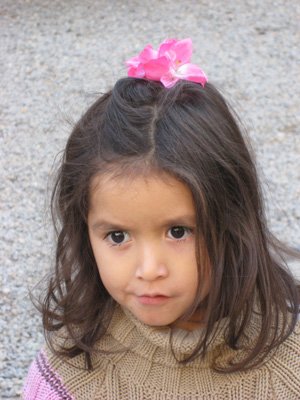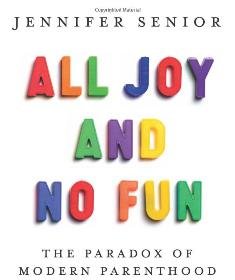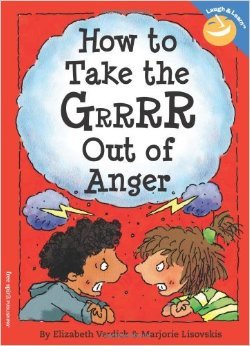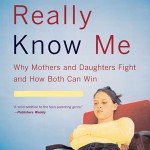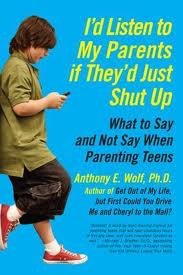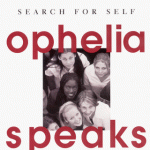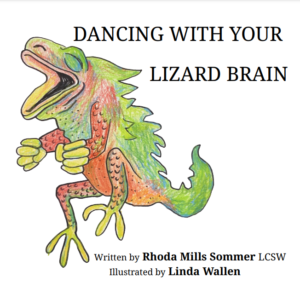– from Holy Fire by Bruce Sterling
– Mike Linderman
Parenting
We spend a lot of time worrying about parenting & thinking about how to be a good parent. Unfortunately there is a current fad in overprotection. So a well intentioned parent believes that wiping your 6 1/2 year old’s butt is a loving thing to do instead of recognizing it’s one more interruption on the road to greater confidence & independence.
Parenting well means knowing that kids need to be uncomfortable to face their fears & grow. The experience of making mistakes is the way you learn the most. If kids live inside a giant ball of comfort and don’t suffer any disappointment they aren’t prepared for real life. When every kid on a team gets a trophy they have false expectations of their value.
Parenting the first four years of life are so important that Judith Wallerstein, a child psychologist with thirty years in divorce research, doesn’t recommend divorce when kids are toddlers. (Wallerstein also discourages divorce at age twelve due to the onset of adolescence. She was quoted in Time magazine on April 14th, 2003, “No Fault Divorce?”)
Walking by the fountain at Chautauqua Institution, I overheard a mother with her toddler: “Promise me you will love your brother Charley forever and ever. Promise you will always share with Charley etc.” It is bad parenting, to extract impossible promises. Good parenting would be if she truly could see her daughter instead of her own agenda, she might say more authentically: “I know it’s really hard to share your toys, Charley is younger than you and needs more help.” First acknowledge her daughter’s truth, then what benefits Charley.
Acknowledging where people are first, before requiring the good deed would be more authentic parenting than what really amounts to a “guilt trip.”
The most important thing you can do as a parent if you’ve made a dreadful mistake, is to acknowledge the truth. The truth is the path that authenticity and trust builds on. I apologize more than anybody in our family (my kids say that’s because I need to most often). My son apologizes the least, but it’s not from a lack of role modeling on my part. Step up to the plate and acknowledge when you overreact instead of pretending it’s forgotten.
We all have our strengths and weaknesses in parenting. So many believe going to therapy means blaming mom or dad. In reality, personal therapy is about understanding a more accurate picture of who we are. What are the strengths, weaknesses and missing parts?
A majority of families have things they do well, combined with dysfunctional parts. This is why the African saying, “It takes a village to raise a child,” is such a healthy idea. It is impossible for any of us to do all the parts of parenting well every year.
Therapy is a way of putting a picture together in order to feel more whole to be better at parenting. In 2003, I attended a workshop with Daniel J. Siegel, M.D., an authority on brain research as it relates to parenting, he said the #1 factor in poor parenting is the group of parents who had poor childhoods themselves and who didn’t solve making their childhood pain bearable.
He has a terrific book designed to increase thoughtfulness about this called Parenting from the Inside Out , co-authored with Mary Hartzel.
If you are divorced and parenting, do not buddy up with your kids against the other parent. Kids really need both of you. Splitting kids’ loyalties is an emotionally dangerous business. Parenting means it’s important to go so far as to acknowledge your spouse’s strengths, and to be specific so it’s more real.
Even though sex education may make you very uncomfortable it is really important to offer to your children in good parenting. A useful book on sex that is written for younger children and is delightful would be “Where Did I Come From? ” by Peter Mayle.
Overprotection is Really a Bad Idea
One of the many wonderful aspects about raising children is that elegant dance of knowing what’s important combined with letting go and not knowing. The not knowing leaves room for respecting their choices as different from your own ideas of who they should be. Too many parents stifle and interrupt children’s abilities to make their own mistakes and their own choices.
According to Hanna Rosin in Atlantic Monthly, “In the past generation, the rising preoccupation with children’s safety has transformed childhood, stripping it of independence, risk-taking, and discovery. What’s been gained is unclear: rates of injury have remained fairly steady since the 1970s, and abduction by strangers was as rare then as it is now. What’s been lost is creativity, passion, and courage. Now a countermovement is arising, based on mounting evidence that today’s parenting norms do children more harm than good.”
There really is something to be said about choosing your own playmates instead of being scheduled, the boredom of all the “safe” playgrounds and the lack of respect for kids developing their own skills of independence by making mistakes & facing difficult choices. A child pays a big price is paid for safety to create comfort for parents.
It is impossible to achieve personal growth without being uncomfortable.
Learning Problems & Parenting
When challenges are either too great or too simple, kids struggle with learning. The skills they develop must equal the challenges they face. It’s important to understand difference in learning and Dr. Mel Levine has a terrific web site at All Kinds of Minds, that parents should seek out. He also has a book called, The Myth of Laziness: How Kids and Parents Can Become More Productive .
Books of Non-Fiction about Parenting:
How to Talk So Kids Will Listen & Listen So Kids Will Talk
by Adele Faber &Elaine Mazlish
All Joy & No Fun- the paradox of modern parenthood
by Kevin Leman
Teach Your Children Well : Why Values and Coping Skills Matter More Than Grades, Trophies, or “Fat Envelopes” by Madeline Levine
How Children Succeed: Grit, Curiosity, and the Hidden Power of Character by Paul Tough
Good Friends Are Hard to Find: Help Your Child Find, Make, and Keep Friends by Fred Frankel For Parents of Five – Twelve yr. olds
How to Take the Grrrr Out of Anger (Laugh And Learn) For ages 9-12
The Blessing of a Skinned Knee: Using Jewish Teachings to Raise Self-Reliant Children by Wendy Mogel
The Happiest Baby on the Block: The New Way to Calm Crying and Help Your Newborn Baby Sleep Longer by Harvey Karp
The Kissing Hand by Audrey Penn (A children’s book about a raccoon with school separation anxiety)
“Remember that too much obedience will end up in spite.” – Fritz Perls
“When you are a parent you are asked two questions a thousand times a day. Do you love me? Are you tough enough to handle this?” – Bob Vandepol
Parenting Teenagers
Teenagers push boundaries and rejecting values instilled by parents. I have taken the liberty of defining adolescence as the ages 13-25. Expect a high level of self-absorption during this time. They are the center of the universe and parenting is extremely difficult.
Remember that acting out is the beginning of independence.
Parenting means recognizing you clearly are a constant source of embarrassment and know they are also easily embarrassed. It’s a time for risk taking, and being both scared and excited when going off to college is the right mix.
If parents push teenagers to fit the parents’ definitions and back them into a corner to be extremely good, I guarantee that is bad parenting. Balance this understanding with the clarity that kids are not supposed to be in charge.
Teenagers should not be allowed to negotiate their way out of everything. Good parenting means privileges are not an entitlement; they need to be earned. Good parenting means teenagers must learn to keep their word.
Consequences teach teenagers to think and to learn from their mistakes. Consequences cannot be empty threats or it’s bad parenting. It’s better not to create consequences in the first flush of crisis, because they are often completely unreal or there is a lack of follow-thru – go to NetFlix and watch Friday Night Lights. It’s a terrific show that is well acted & rings true about adolescent struggles.
Below are insights derived from a November 2005 workshop with Ron Taffel Ph.D. (Shared with his permission).
Research shows that families that share meals together have healthier kids. Families today are missing too many rituals and rules. A ritual can be as simple as pizza together on Sunday night. Kids end up having rituals with each other instead of their families.
Kids today have lost track of who they are because they are caught up with looking beautiful, consumerism, and celebrity.
Parents are terrible listeners. Parents lecture based on their assumptions. This is compounded by adolescents who often have bad timing when they’re ready to talk. When you listen to your children remember that kids live in the details of things. Have the patience to stick with the superficial because if you listen well the conversation will evolve to important places.
Dr. Taffel offers these three words in his practice with adolescents; “Delay, Delay, Delay”. Kids are so bombarded by bad choices in drinking and oral sex that delay becomes an excellent goal. Parents and kids too often don’t accurately know each other. You want to take the risk of knowing your kids because there is no greater gift you can give to them or receive from them.
Dr. Taffel has two books he co-wrote with Melinda Blau Ph.D. “Nurturing Good Children Now: 10 Basic Skills to Protect and Strengthen Your Child’s Core Self or Published in paperback March 2007 Parenting by Heart: How to Stay Connected to Your Child in a Disconnected World .”
THE TEEN BRAIN:
Freedom & Power & Parenting
When my son left for college I asked him “What was the best part of his life?” he responded immediately with two words “It’s mine.” Freedom and power are what they crave, so good parenting means thinking of creative ways to give them both, or be prepared for lying as one way adolescents will protect their freedom.
Do you remember being a teenager and wanting freedom and power? Then you certainly didn’t want to consider how you might be like your parents. Remember your own adolescent struggles. Some acting out is helpful in stretching boundaries and differentiating.
Here is an example of a healthy acting out. In the summer before 12th grade, my son was cited along with four friends for laying hot dogs in the road and laughing, holding up a bright neon-orange sign that spelled out, “Caution-Hotdogs” (which was later introduced as evidence). There was no drinking or drugs, just a great clean prank. When my husband told a friend who happened to be a city magistrate about the legal brouhaha, she wished that she had to deal with that kind of problem. This is the kind of trouble you wish for and it has the added bonus of learning more respect for authority.
Adolescents are trying to define themselves as different than their parents. Parents need to have respect for the process along with a balance of clear limits and boundaries.
In parenting teenagers, respect problems are classic. My biggest improvement with my daughter was to not take things so personally, to be able to be more indifferent. It helps to understand parents are considered annoying. Risk asking your teen in what specific ways you are annoying to learn more respect for their point of view, that’s good parenting.
Adolescents should not be seen as peers or friends who can do anything they want. Parenting well means needing to be respect that they are testing limits.
Adolescents are a delicious blend of polarities: they can be very loyal and take you completely for granted. They can chatter and communicate and be very withdrawn. They can surprise you by being both very responsible and very irresponsible. They can be so smart and bright and make very foolish mistakes. They can be independent and dependent. It is very intense for everyone in the family to bounce around in all of those possibilities.
Adolescents can be very creative in ways to get to you because they are oh-so-determined to win.
There are really six things you can do to be better at parenting adolescents:
1. Get indifferent/Don’t get caught up in the drama
I remember threatening my father with, “I’m leaving” and he would take all the wind out of my sails by saying, “I’ll help you pack your bags”
2. Listen/Don’t preach/Be curious
Listen, listen, listen without judgment, and put your hand over your mouth to prevent preaching. Preaching and complaining can be such a one-dimensional relationship, make the more interesting choice to be curious instead. Create a three-dimensional relationship.
3. Be consistent and fair with rules and consequences/Don’t blow up and dump.
Impulsively blowing up is the trap of mirroring their system, of being like them, which is a mistake.
4. Be honest and vulnerable/Don’t be prickly and defensive.
If you can acknowledge your own mistakes, it keeps things more authentic. Remember, intimacy is built upon shared power. Share your own experience of being self-righteous and perhaps they can begin to see themselves.
5. Remember kids need room to make their own mistakes and learn from those mistakes. Remember that kids’ brains do not become hard wired for improved judgment until age 25.
6. Expect values to clash.
It’s part of separation and healthy individualism. Adolescents must juggle becoming their singular self, balanced with enduring connections to others. Parents must support both sides of this effort.
Understanding the Teenage Brain
The cover story for Time magazine on May 10th 2004 described “A paucity of the cognitive controls needed for mature behavior… (their) feelings reach a flash point more easily, (and) adolescents tend to seek out situations where they can allow their emotions and passions to run wild!” Adolescents want intensity in their feelings. At the age of 25, the prefrontal lobe of the brain is finally wired and more mature.
•In The Daily Mail from the UK 4/2014 What makes teens terrible: Scientists find brain ‘disconnect’ causes emotional outbursts and bad behaviour
Say limbic system, which controls emotion, behavior and motivation is affected
Region communicates differently with the rest of the brain in teens
Book to Help Mothers & Daughters Who Are Fighting
It is common for mothers and daughters to fight often. In 2004 there was a research study done in Britain that determined arguments between mothers and daughters are a way to build connections. Terri Apter, a researcher for this study says their evidence suggests “… that both mothers and daughters can gain from the opportunity that arguing provides. For mothers particularly, recognizing the positive purpose of the inevitable quarrels may ease the daily tensions.” She has written a book: You Don’t Really Know Me: Why Mothers and Daughters Fight and How Both Can Win Conflict can be a good thing.
TEEN SUICIDE

Information on Teen Suicide from Sr.Madeleine Rybicki CSFN,MS April 2018 workshop.
15 WARNING SIGNS OF TEEN SUICIDE:
1. Change in eating & sleeping
2. Withdrawal from friends, family & activities
3. Violent, rebellious & running away
4. Drug & alcohol abuse
5. Marked Personality Change
6. Unusual neglect of personal appearance
7. Persistent Boredom, difficulty concentrating or decline in school work
8. Complaints about physical symptoms related to emotions
9. Loss of interest in pleasurable activities
10. Not tolerating praise or rewards
11. Low self-esteem, sense of hopelessness
12. Uncontrollable crying, angry outbursts
13. Sudden personality change, moodiness
14. Withdrawal,loss of appetite
15. Impulsive or risky actions
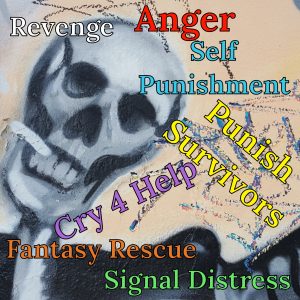
The picture above describes different motives for Teen Suicide. Parents need to remember that Teens do want to talk about it.
8 Known Causes of Teen Suicides
1. Feelings of Inadequacy: “I’m No Good.”
2. Sense of Rejection: “Nobody Likes Me.”
3. Intense Loneliness: “There’s Nobody I can count on.”
4. Lack of Direction: “Nothing to Live For.”
5. Poor Communications: “No One Understands.”
6. Hopelessness: “There’s no reason to go on.”
7. Drugs & Alcohol: “Nothing I take gives me relief.”
8. Academic pressure: “I can’t live up to what everyone expects of me.”
Bad Choices & Teenagers
When your teen gets their license don’t you cringe expecting them to crunch the car? Bad choices are a part of growing up. Try to remember everyone learns more from their mistakes.
One of my thoughtful teen clients put it this way:
My reasons for making bad choices and letting friends influence me to do so:
1. To be part of the crowd/peer pressure.
2. To do what I want (sense of rebellion). “Living a little dangerously.”
3. No excuses.
* To put it bluntly no reason is a good reason to do what I have done.
Don’t Project on Your Kids
Raising Korean-born children in Pittsburgh, a city of intense blood connections where adoption is seen as a last resort, I felt compelled to ask my mentor, Sonia Nevis, if there was anything better about adoption than natural birth. My Gestalt-based therapy teaches the duality of everything and I found myself uncertain. She responded readily with, “Why, you’ll project less of you onto them and be more respectful of their uniqueness.” Of course she is right and this would be a good attitude for any parent to adopt in adolescence.
For example when you look at colleges are you thinking of what you wish your choices were or are you filtering yourself out and being open to listening to their ideas about the process?
Defining Territory
Good parenting means trying to be creative about safe ways for adolescents to have power and control. A big battle I often have with parents is to let their kids define the territory of their room. Insist they make periodic hunts for wet towels, dirty dishes or to un-bury the rug to be vacuumed. Don’t snoop unless there is drug or alcohol use seriously suspected.
Parenting well means giving kids opportunities. Let the kid ride the bus alone downtown, open up a bank account, and wear their hair any way they want. (Remember hair grows back.)
I’m not suggesting support for the culture of indulgence that baby boomers have created for children. It’s a dance of energy between support for power and independence, and clarity about limits and boundaries. This dance is much more complicated work than the simplistic, “ignore the problems” or “substitute materialism for listening.”
A good example of this can be found in the treasure of a book, Empire Falls by Richard Russo. The character of Miles Robey is really terrific at grabbing those moments for hugs and listening. Mr. Russo’s acknowledgments include his daughter, “for reminding me by means of concrete detail just how horrible high school can be, and how lucky we all are to escape more or less intact.”
“Growing up is honestly facing painful situations.”
(Fritz Perls)
High school’s ruthless social hierarchy is the beginning of this process. Honor and remember the difficulty of this process.
In parenting, you can make mistakes by being mothers or fathers who are too good or too neglectful. Parents who tend to be too good are filling up the space with their agenda. For example, loading the question: “Of course you’ll make dinner with us every Sunday” vs. “Does dinner fit in with your plans for Sundays?”
Ask an honest question that leaves room for negotiation. “Yes mom, once a month when it’s not a month with a holiday would be great.” There is more respect for the process of differentiation in the second question. Give them room and they’ll enjoy coming back to spend time with you.
Make kids feel guilty, then you end up with a lot of unspoken resentments, which totally erodes any relationship.
Expectations & Parenting
Parents get caught in the expectation trap of seeing themselves in their children. They expect their children to be just like them. Seeing your son or daughter well, for who they really are, is the whole point of parenting. It is a process of loving and teaching. A therapist offers a client the experience of being seen really well – or the process isn’t working.
I’m so grateful my son had a video teacher, Mr. Martin, who really did see him and had learned who he was during his four years of high school. That kind of being seen is such a rare commodity in high school.
Parenting well means your expectations shouldn’t be overwhelming. For example: they want me to go to Med school, but I want to be a gym teacher. It is important, though, that some expectations do exist. Kids need to do chores and contribute to the household. Are you a mom whose kids only clean off the table? That’s a problem.
Future Relationships
Remember that as parents, you are the template for your kids’ future relationships. This is especially true for mothers and sons and fathers and daughters. For example, if a son feels invisible to his mother because she’s obsessed with housekeeping or a career, he is likely to choose girlfriends who do not see him either.
Teenage Girls & Love

Teenage girls having only crushes and not a steady boyfriend in high school can be a good thing. At this age, a boyfriend too easily can become someone to desperately please. Teenage girls need to get on track with the work of defining themselves and what pleases them.
There are four movies I have asked my daughter to watch to expand her thinking about love. All four of these are more specifically described on the Movie Page (they are the first four listed).
1. Mansfield Park (1999)
2. As Good As It Gets
3. Emma
4. Girlfight (Caution: Constant Swearing)
Scarleteen.com – A great web site for teens that gives honest sexual information.
Teenagers & Stress
Our culture is too frantic and kids are too scheduled. In good parenting, it’s your job to remember that stress is not an experience unique to adults. Help kids to think about their sources of stress.
Some obvious examples of stress are sex, perfect grades, and death (of a peer or a relative). Boyfriends and girlfriends and all the drama that emerges can also be stressful. Even the common teenage complaint of boredom can trigger stress. Too many plans or weekends where last minute plans have fallen through can be taxing.
Greater awareness is the first step in any healing process and this is something parents can help out with. Acting out offers relief, but is not always desirable. Overreaction can in part be due to unresolved stress that has built up. Every kid should know what their triggers are and how stress is a tangible in their life.
Help kids to understand that stress is a balancing act between demands and your resources.
Resources for Bullying:
• Taking the Bully by the Horns – Children’s Version of the Best Selling Book, by Noll & Carter.
• Ben X is a lovely movie about an autistic teen who is bullied because he’s different. It was made in 2007 in Belgium and has a truly glorious, surprising ending.
• Follow this link for Tons of helpful information
• Helpful information for LGBT teens
Web sites for Teens and Parents
GirlsInc.com – there is a separate area for teen girls. It is put together by adults and teens. It includes lots of physical and emotional health information, along with inspiring stories.
Mouse Party-Helps kids grades 9-12 experience the brain on different drugs
The National Campaign – for information on teen sex & unplanned pregnancy. The proportion of high school students who have had sex has declined from 54% in 1991 to 46% in 2009.
Reachout – this web site from Australia provides information and help to sort things out.
The Trevor Project – website and suicide/crisis phone line for gay and questioning teens. 886-4-U-TREVOR
TeensHealth.org – this web site provides links for both teens and parents on all kinds of issues including life after high school.
Books of Fiction about Parenting:
American Pastoral by Phillip Roth. If you have a kid who has fallen completely off track, this book could be very helpful. It is fiction about a Patty Hearst-type character
Breaking Her Fall by Stephen Goodwin is a work of fiction that portrays family life in a crisis and the truely meaningful painful work of a parent struggling to maintain connections with his adolescents. Well worth reading.
Fortunate Lives: A Novel by Robb Forman Dew is a lovely work of fiction if kids are leaving for college.
Books (non-fiction):
I’d Listen to My Parents If They’d Just Shut Up: What to Say and Not Say When Parenting Teens by Anthony Wolf.
The Confident Child: Raising Children to Believe in Themselves by Terri Apter. This book takes the vagueness out of self esteem for parents.
The Myth of Maturity: What Teenagers Need from Parents to Become Adults by Terri Apter about Thresholders.
Ophelia Speaks: Adolescent Girls Write About Their Search for Self by Sara Shandler is a good book to buy or give to adolescent girls. She interviews teens and this book rings true because it is their voices she captures.
Reviving Ophelia: Saving the Selves of Adolescent Girls (Ballantine Reader’s Circle) by Mary Phiper has become a classic testimony to the damage our media-saturated culture has imprinted on teens.
The Teen Whisperer: How to Break Through the Silence and Secrecy of Teenage Life by Mike Linderman
The Romance Of Risk: Why Teenagers Do The Things They Do by Lynn Ponton MD.
When No One Understands: Letters to a Teenager on Life, Loss, and the Hard Road to Adulthood by Brad Sachs is a wise book of letters written by a therapist to a young client. This book offers excellent insight.
TV Series & Parenting:
Friday Night Lights (2006-2011)
Friday Night Lights is one of the best dramas on tv. There has never been a show that so accurately captures the struggles of high school life. Terrific characters with a lot of complexity that makes them feel real. All 5 seasons are highly recommended!
Movies
Juno (2007)

High School unplanned pregnancy, told with humor. Delightful movie.
Thirteen (2003)

Ghost World (2001)

Gives insight into alienated kids who are lonely & bored. Very real characters.


